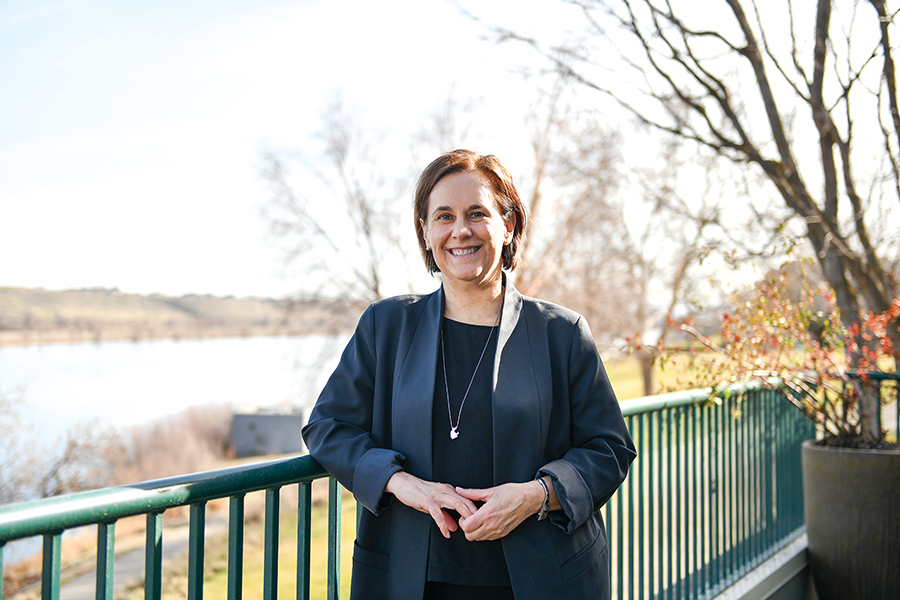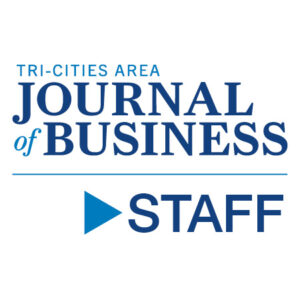
Home » Q&A with Sandra Haynes
Q&A with Sandra Haynes

March 16, 2020

Chancellor
Washington State University Tri-Cities
Number of employees you oversee: Approximately 245 faculty and staff
What is WSU Tri-Cities and how does it fit into the Washington State University system?
WSU Tri-Cities is a four-year public research university in the Tri-Cities, and is one of six university campuses in the WSU system. The other WSU campuses are located in Pullman, Spokane, Vancouver, Everett and online through WSU Global. Washington State University is an R1 research university, a top research university in the United States.
Each WSU campus has its own unique strengths that help WSU serve the needs of the state of Washington. WSU Tri-Cities’ strengths lie in the STEM fields and, of course, wine science, as well as an assortment of more traditional programs with a focus on meeting the educational and workforce needs of the Tri-Cities and surrounding community. Stemming from our land-grant mission, WSU is dedicated to providing exceptional teaching and instruction, research that benefits local industry, as well as community service throughout the mid-Columbia region and beyond.
Brief background on the Tri-City campus:
WSU Tri-Cities started in 1948 as the General Electric School of Nuclear Engineering to offer graduate-level education in engineering to assist with the burgeoning need for engineers with advanced degrees for the Hanford Site. It became a regional WSU campus in 1989 and now offers full bachelor’s and graduate programs.
We offer 20 bachelor’s degrees and 33 graduate degrees, both master’s and doctoral programs, in STEM fields, business, education, nursing and the liberal arts.
WSU Tri-Cities also operates the largest GEAR UP program in the state, providing college readiness resources in several local K-12 schools, and offers a Running Start program that allows high school students to take college courses at little to no cost to them.
How effective are all of these programs? Extremely. Approximately 92 percent of graduates secure a job or are pursuing graduate school within six months of graduation. If you did the math, you’ll know that this year, WSU Tri-Cities also celebrates 30 years in the Tri-Cities as a WSU campus—we invite you to join us as part of our Crimson Fest celebration on April 18!
How did you land your current role? How long have you been in it? What drew you to this work?
I am a first-generation college student who had a wise, eighth-grade educated grandmother who once told me that higher education could lead to social mobility and a healthy lifestyle. She encouraged me to go on to college when others were not supportive. I decided to study psychology because I am fascinated by the human brain/behavior connection. I received a bachelor’s degree in psychology and master’s and doctorate degrees in experimental neuropsychology. I returned to higher education as a faculty member largely out of a passion to help others realize their potential. Later, I went into university leadership because I saw that it was a way to make a larger impact on the lives of students, including those just like me.
Prior to coming to WSU Tri-Cities, I served as deputy provost and vice president of academic affairs at the Metropolitan State University of Denver. The position of chancellor at WSU Tri-Cities presented many exciting opportunities to lead a campus in a thriving region with seemingly limitless opportunities. It was an honor to be selected for the role of chancellor from a national pool of candidates and to join a team of eager colleagues that truly want to make a difference for our community. As of this month, I have served as chancellor of WSU Tri-Cities for two years.
What major initiatives is the campus focused on at the moment?
WSU Tri-Cities is wrapping up our five-year campus strategic plan, which will debut this spring. In line with the first WSU system-wide strategic plan, which also debuts very soon, our campus strategic plan will set the stage for our campus goals to realize our preferred future.
WSU Tri-Cities broke ground this month on a new academic building that will house an assortment of new teaching laboratories, study and meeting spaces, and an auditorium-style seating area that will be ideal for open presentations. All students will interface with this building at some point, whether it be through a campus lab, in meetings with fellow students and faculty, or hanging out with friends. We are grateful to the state Legislature for funding this facility.
And finally, as a campus, we strive to serve the needs of a fast-growing population. Whether it be through strategic research to help provide solutions to local and global needs, such as through our Bioproducts, Sciences and Engineering Laboratory, or through support programming like resources offered through our new MOSAIC Center for Student Inclusion and our newly renovated Veterans Center, we are constantly looking to grow programs and opportunities to support student and community success.
What should Tri-Citians know about WSU Tri-Cities in terms of programs and impact on the community?
Located in the heart of the Tri-Cities research district and in the thriving Tri-Cities regional community, the sky is the limit for what WSU Tri-Cities can achieve in partnership with our local industry and our regional community.
Because of our small size, students receive one-on-one support in their classes, and are exposed to many opportunities for real-world learning both inside and outside of the classroom in partnership with local industry. We strive to be a solution and a partner on many community initiatives, and want to ensure that we are meeting the educational needs of all sectors of our community. We are the most diverse campus in the WSU system, and we aim to provide support and resources for students from all backgrounds.
What is one characteristic that you believe every leader should possess?
Compassion. Compassionate leaders encourage and empower those around them, help to create a shared vision, and provide a great working environment. I firmly believe that this is the most powerful tool for inspiring others. Compassion allows great ideas to grow through a sense of genuine caring.
What is the biggest challenge facing you as a manager today?
Although I am delighted that we reside in a state that cares about higher education, we are still facing funding challenges and our budgets are below pre-recession funding. We are thrilled that the state Legislature increased its support for student higher education grants through the Washington College Grant.
As we see a shifting student population to those who are the first in their family to attend college, additional resources also are needed to better support on-campus programs to ensure student success.
If you had a magic wand, what would you change about your field?
Higher education needs to be more nimble and flexible with offerings, change, etc., across the board. This isn’t something that is unique to just Tri-Cities. This applies to colleges and universities across the country. We have a goal in the state of Washington of 70 percent credential attainment for Washington students by age 26. In order to achieve this, we must get creative for how we meet the higher education needs of our state.
What advice would you give someone going into a leadership position for the first time?
Work hard and be yourself. Things don’t work and they certainly don’t change without tenacity, patience, and an incredible amount of hard work. Good leaders are also authentic and genuine.
Who are your role models?
My role models were my maternal grandparents. They taught me the value of hard work and doing good in the world wherever you are.
I’ve also had several formal and informal mentors throughout my professional career. Informal mentors are individuals that lead by example and individuals that I have watched both from up-close and from afar. My formal mentors have been individuals I met along the way throughout my journey who assisted me in small and large ways.
How do you measure success in your workplace?
You have to measure success by both quantitative and qualitative measures. We look for the number of students that we retain, the number that graduate, how well our classes are taught and the quality of research that we complete.
But the intangibles are the things that you see day-to-day and, at the ultimate test of success, commencement. You see students walk across that graduation stage, some who never thought they would obtain their degree, and you see the joy in the sense of their accomplishment. And, everyone at WSU Tri-Cities, from the custodians, to our campus leaders, helped make that success possible.
How do you keep your employees motivated?
Reminding people of why we are here and what joy it is that we are doing for people, our society and our community. Higher education is the investment that keeps on giving. You can take everything away from someone, but you can’t take their education away. We are helping students grow and realize their potential.
What do you consider your leadership style to be?
A mix of transformational leadership and servant leadership. I enjoy working in teams to identify reasonable holistic solutions to everyday problems, and to help elevate my colleagues in a team environment. It is as a team that we can accomplish great things. As a servant leader, I truly believe that no job is too small for the person up top. We all need to pitch in to make our teams, our students and our community as successful as possible.
How do you balance work and family life?
In today’s environment, where technology is included in nearly every aspect of our lives, it is hard to have that distance from work.
There are also many literature references that state that it is not so much a strict separation that is realistic, but a healthy work-to-life integration.
I believe it is about being intentional about the time spent at work and time spent with family and friends. You could have a lovely Saturday morning with your spouse drinking coffee and reading the paper, and then know you want to dedicate two hours in the afternoon to work. It’s all about scheduling out time for these activities and being committed to making it happen.
What do you like to do when you are not at work?
I love to spend time with my husband and daughter. I like to take long walks and, in true downtime, enjoy the occasional Netflix binge.
What’s your best time management strategy?
If you need to do it, put it on your calendar. What gets scheduled, gets done.
Best tip to relieve stress?
Take a walk to clear your mind. And, be sure to make time for those who matter most.
What’s your favorite podcast? Most-used app? Favorite book?
My most-used app is Audible. I like to read and listen to books about leadership, human behavior and psychological intrigue.
My favorite podcast is the NPR Life Kit—so many useful tips and tricks on that show.
Favorite book, well, there are so many!
Q&A Local News Education & Training
KEYWORDS march 2020





